Finance Portfolio Management: Investor Psychology Impact
VerifiedAdded on 2022/10/17
|7
|1191
|371
Report
AI Summary
This report provides an in-depth analysis of finance portfolio management, focusing on the crucial role of investor psychology in asset pricing. It begins by summarizing the paper's core argument: that investor psychology significantly impacts market efficiency and the valuation of assets. The report delves into the research hypothesis, which investigates the influence of investor decision-making on stock prices. The methodology involves a review of existing research and theories, including static and dynamic asset pricing models, to understand how investor behavior affects portfolio construction and risk assessment. The study results highlight the limitations of current models in capturing the complexities of investor psychology, advocating for continuous testing to understand evolving investor behaviors. The implications of the paper underscore the importance of understanding investor psychology for both individual investors and market participants, emphasizing the need for incorporating psychological factors into financial models to improve predictions and investment outcomes. The report also touches upon the implications of the study and suggests the need for future research in the area of investor psychology and its impact on asset pricing.
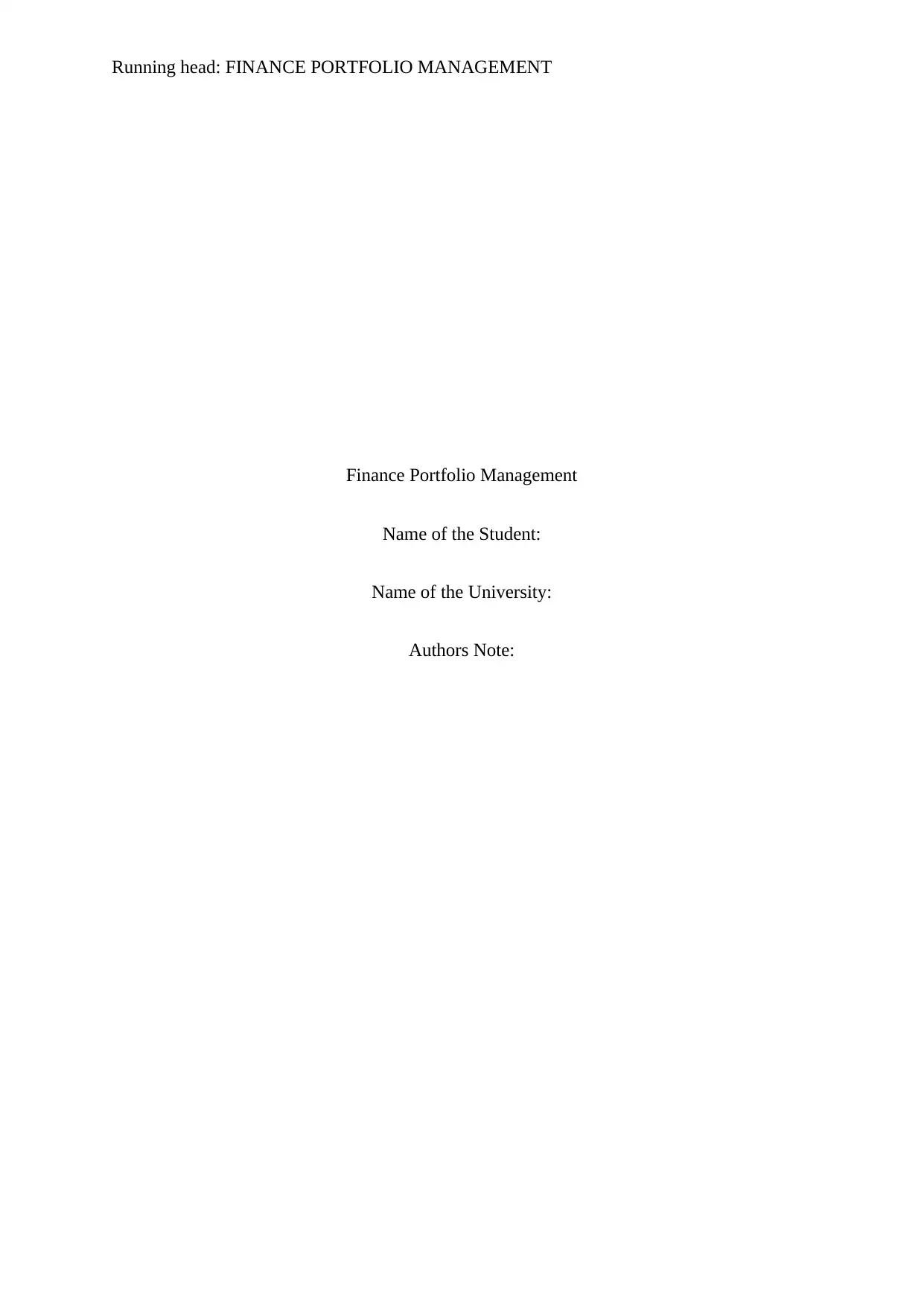
Running head: FINANCE PORTFOLIO MANAGEMENT
Finance Portfolio Management
Name of the Student:
Name of the University:
Authors Note:
Finance Portfolio Management
Name of the Student:
Name of the University:
Authors Note:
Paraphrase This Document
Need a fresh take? Get an instant paraphrase of this document with our AI Paraphraser

FINANCE PORTFOLIO MANAGEMENT
1
Table of Contents
1. Summary of the paper:...........................................................................................................2
2. Research hypothesis or research purpose:..............................................................................2
3. Data and methodology:..........................................................................................................3
4. Study or test results:...............................................................................................................4
5. Implications of the paper:.......................................................................................................4
Bibliography:..............................................................................................................................6
1
Table of Contents
1. Summary of the paper:...........................................................................................................2
2. Research hypothesis or research purpose:..............................................................................2
3. Data and methodology:..........................................................................................................3
4. Study or test results:...............................................................................................................4
5. Implications of the paper:.......................................................................................................4
Bibliography:..............................................................................................................................6
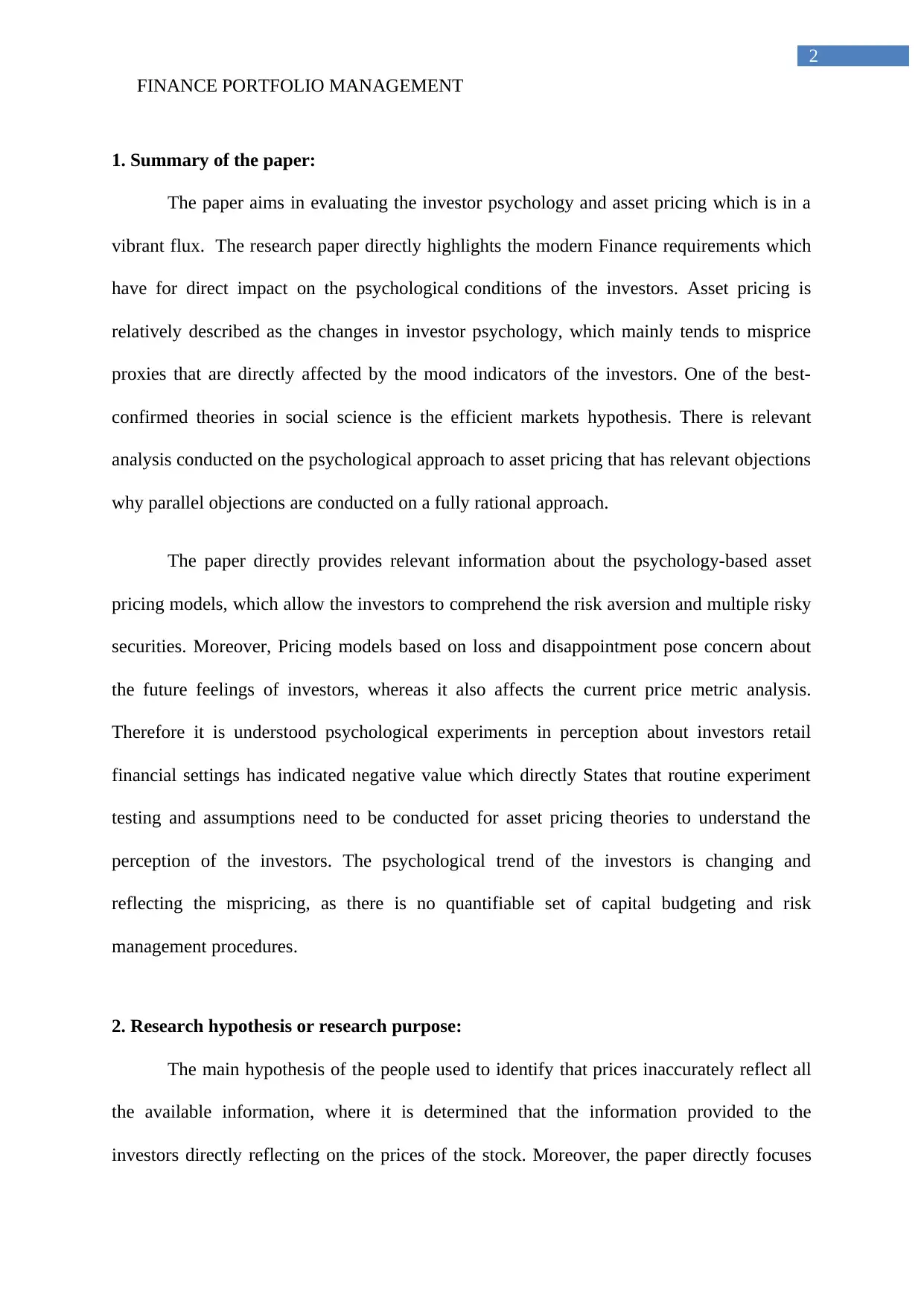
FINANCE PORTFOLIO MANAGEMENT
2
1. Summary of the paper:
The paper aims in evaluating the investor psychology and asset pricing which is in a
vibrant flux. The research paper directly highlights the modern Finance requirements which
have for direct impact on the psychological conditions of the investors. Asset pricing is
relatively described as the changes in investor psychology, which mainly tends to misprice
proxies that are directly affected by the mood indicators of the investors. One of the best-
confirmed theories in social science is the efficient markets hypothesis. There is relevant
analysis conducted on the psychological approach to asset pricing that has relevant objections
why parallel objections are conducted on a fully rational approach.
The paper directly provides relevant information about the psychology-based asset
pricing models, which allow the investors to comprehend the risk aversion and multiple risky
securities. Moreover, Pricing models based on loss and disappointment pose concern about
the future feelings of investors, whereas it also affects the current price metric analysis.
Therefore it is understood psychological experiments in perception about investors retail
financial settings has indicated negative value which directly States that routine experiment
testing and assumptions need to be conducted for asset pricing theories to understand the
perception of the investors. The psychological trend of the investors is changing and
reflecting the mispricing, as there is no quantifiable set of capital budgeting and risk
management procedures.
2. Research hypothesis or research purpose:
The main hypothesis of the people used to identify that prices inaccurately reflect all
the available information, where it is determined that the information provided to the
investors directly reflecting on the prices of the stock. Moreover, the paper directly focuses
2
1. Summary of the paper:
The paper aims in evaluating the investor psychology and asset pricing which is in a
vibrant flux. The research paper directly highlights the modern Finance requirements which
have for direct impact on the psychological conditions of the investors. Asset pricing is
relatively described as the changes in investor psychology, which mainly tends to misprice
proxies that are directly affected by the mood indicators of the investors. One of the best-
confirmed theories in social science is the efficient markets hypothesis. There is relevant
analysis conducted on the psychological approach to asset pricing that has relevant objections
why parallel objections are conducted on a fully rational approach.
The paper directly provides relevant information about the psychology-based asset
pricing models, which allow the investors to comprehend the risk aversion and multiple risky
securities. Moreover, Pricing models based on loss and disappointment pose concern about
the future feelings of investors, whereas it also affects the current price metric analysis.
Therefore it is understood psychological experiments in perception about investors retail
financial settings has indicated negative value which directly States that routine experiment
testing and assumptions need to be conducted for asset pricing theories to understand the
perception of the investors. The psychological trend of the investors is changing and
reflecting the mispricing, as there is no quantifiable set of capital budgeting and risk
management procedures.
2. Research hypothesis or research purpose:
The main hypothesis of the people used to identify that prices inaccurately reflect all
the available information, where it is determined that the information provided to the
investors directly reflecting on the prices of the stock. Moreover, the paper directly focuses
⊘ This is a preview!⊘
Do you want full access?
Subscribe today to unlock all pages.

Trusted by 1+ million students worldwide
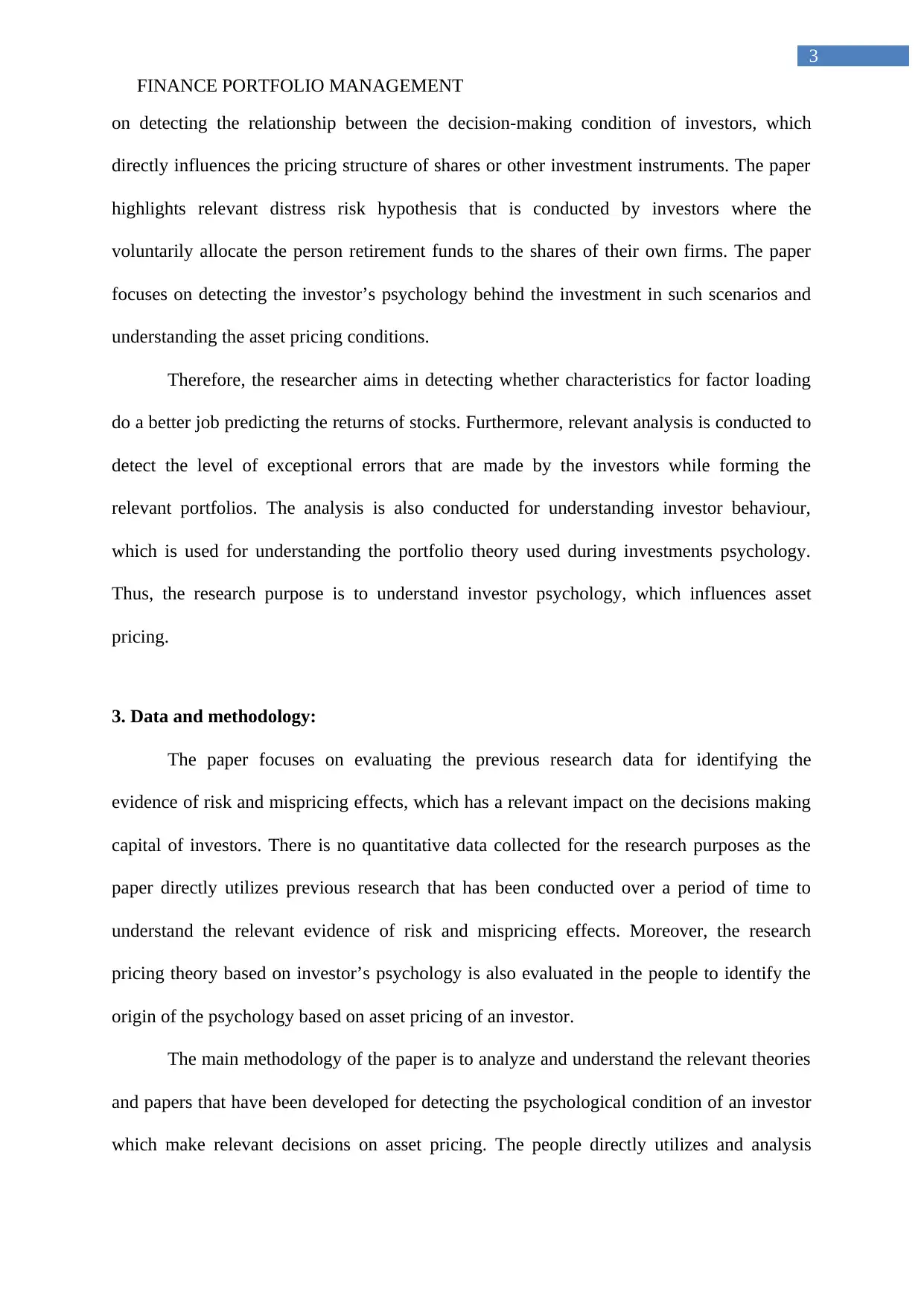
FINANCE PORTFOLIO MANAGEMENT
3
on detecting the relationship between the decision-making condition of investors, which
directly influences the pricing structure of shares or other investment instruments. The paper
highlights relevant distress risk hypothesis that is conducted by investors where the
voluntarily allocate the person retirement funds to the shares of their own firms. The paper
focuses on detecting the investor’s psychology behind the investment in such scenarios and
understanding the asset pricing conditions.
Therefore, the researcher aims in detecting whether characteristics for factor loading
do a better job predicting the returns of stocks. Furthermore, relevant analysis is conducted to
detect the level of exceptional errors that are made by the investors while forming the
relevant portfolios. The analysis is also conducted for understanding investor behaviour,
which is used for understanding the portfolio theory used during investments psychology.
Thus, the research purpose is to understand investor psychology, which influences asset
pricing.
3. Data and methodology:
The paper focuses on evaluating the previous research data for identifying the
evidence of risk and mispricing effects, which has a relevant impact on the decisions making
capital of investors. There is no quantitative data collected for the research purposes as the
paper directly utilizes previous research that has been conducted over a period of time to
understand the relevant evidence of risk and mispricing effects. Moreover, the research
pricing theory based on investor’s psychology is also evaluated in the people to identify the
origin of the psychology based on asset pricing of an investor.
The main methodology of the paper is to analyze and understand the relevant theories
and papers that have been developed for detecting the psychological condition of an investor
which make relevant decisions on asset pricing. The people directly utilizes and analysis
3
on detecting the relationship between the decision-making condition of investors, which
directly influences the pricing structure of shares or other investment instruments. The paper
highlights relevant distress risk hypothesis that is conducted by investors where the
voluntarily allocate the person retirement funds to the shares of their own firms. The paper
focuses on detecting the investor’s psychology behind the investment in such scenarios and
understanding the asset pricing conditions.
Therefore, the researcher aims in detecting whether characteristics for factor loading
do a better job predicting the returns of stocks. Furthermore, relevant analysis is conducted to
detect the level of exceptional errors that are made by the investors while forming the
relevant portfolios. The analysis is also conducted for understanding investor behaviour,
which is used for understanding the portfolio theory used during investments psychology.
Thus, the research purpose is to understand investor psychology, which influences asset
pricing.
3. Data and methodology:
The paper focuses on evaluating the previous research data for identifying the
evidence of risk and mispricing effects, which has a relevant impact on the decisions making
capital of investors. There is no quantitative data collected for the research purposes as the
paper directly utilizes previous research that has been conducted over a period of time to
understand the relevant evidence of risk and mispricing effects. Moreover, the research
pricing theory based on investor’s psychology is also evaluated in the people to identify the
origin of the psychology based on asset pricing of an investor.
The main methodology of the paper is to analyze and understand the relevant theories
and papers that have been developed for detecting the psychological condition of an investor
which make relevant decisions on asset pricing. The people directly utilizes and analysis
Paraphrase This Document
Need a fresh take? Get an instant paraphrase of this document with our AI Paraphraser
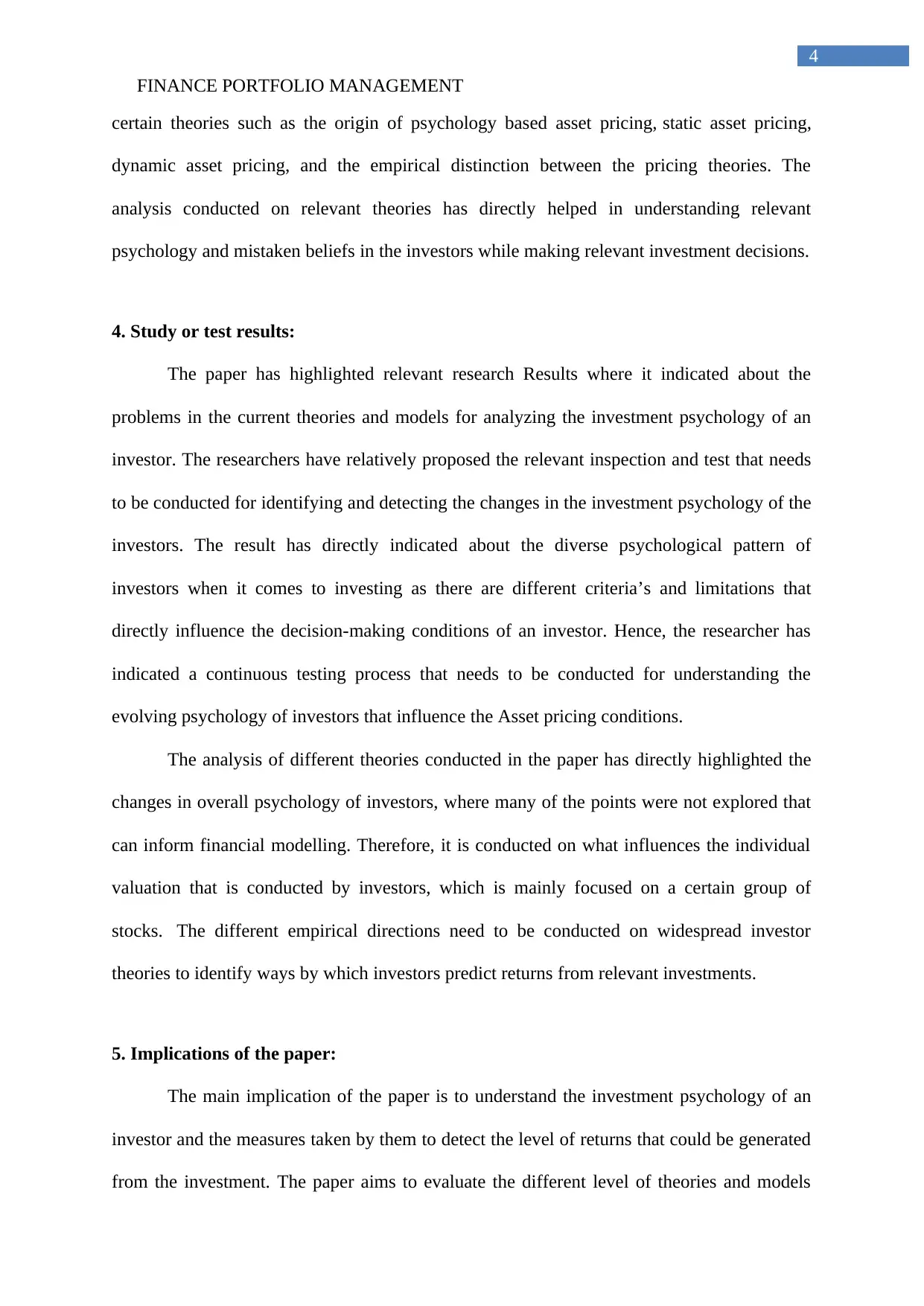
FINANCE PORTFOLIO MANAGEMENT
4
certain theories such as the origin of psychology based asset pricing, static asset pricing,
dynamic asset pricing, and the empirical distinction between the pricing theories. The
analysis conducted on relevant theories has directly helped in understanding relevant
psychology and mistaken beliefs in the investors while making relevant investment decisions.
4. Study or test results:
The paper has highlighted relevant research Results where it indicated about the
problems in the current theories and models for analyzing the investment psychology of an
investor. The researchers have relatively proposed the relevant inspection and test that needs
to be conducted for identifying and detecting the changes in the investment psychology of the
investors. The result has directly indicated about the diverse psychological pattern of
investors when it comes to investing as there are different criteria’s and limitations that
directly influence the decision-making conditions of an investor. Hence, the researcher has
indicated a continuous testing process that needs to be conducted for understanding the
evolving psychology of investors that influence the Asset pricing conditions.
The analysis of different theories conducted in the paper has directly highlighted the
changes in overall psychology of investors, where many of the points were not explored that
can inform financial modelling. Therefore, it is conducted on what influences the individual
valuation that is conducted by investors, which is mainly focused on a certain group of
stocks. The different empirical directions need to be conducted on widespread investor
theories to identify ways by which investors predict returns from relevant investments.
5. Implications of the paper:
The main implication of the paper is to understand the investment psychology of an
investor and the measures taken by them to detect the level of returns that could be generated
from the investment. The paper aims to evaluate the different level of theories and models
4
certain theories such as the origin of psychology based asset pricing, static asset pricing,
dynamic asset pricing, and the empirical distinction between the pricing theories. The
analysis conducted on relevant theories has directly helped in understanding relevant
psychology and mistaken beliefs in the investors while making relevant investment decisions.
4. Study or test results:
The paper has highlighted relevant research Results where it indicated about the
problems in the current theories and models for analyzing the investment psychology of an
investor. The researchers have relatively proposed the relevant inspection and test that needs
to be conducted for identifying and detecting the changes in the investment psychology of the
investors. The result has directly indicated about the diverse psychological pattern of
investors when it comes to investing as there are different criteria’s and limitations that
directly influence the decision-making conditions of an investor. Hence, the researcher has
indicated a continuous testing process that needs to be conducted for understanding the
evolving psychology of investors that influence the Asset pricing conditions.
The analysis of different theories conducted in the paper has directly highlighted the
changes in overall psychology of investors, where many of the points were not explored that
can inform financial modelling. Therefore, it is conducted on what influences the individual
valuation that is conducted by investors, which is mainly focused on a certain group of
stocks. The different empirical directions need to be conducted on widespread investor
theories to identify ways by which investors predict returns from relevant investments.
5. Implications of the paper:
The main implication of the paper is to understand the investment psychology of an
investor and the measures taken by them to detect the level of returns that could be generated
from the investment. The paper aims to evaluate the different level of theories and models
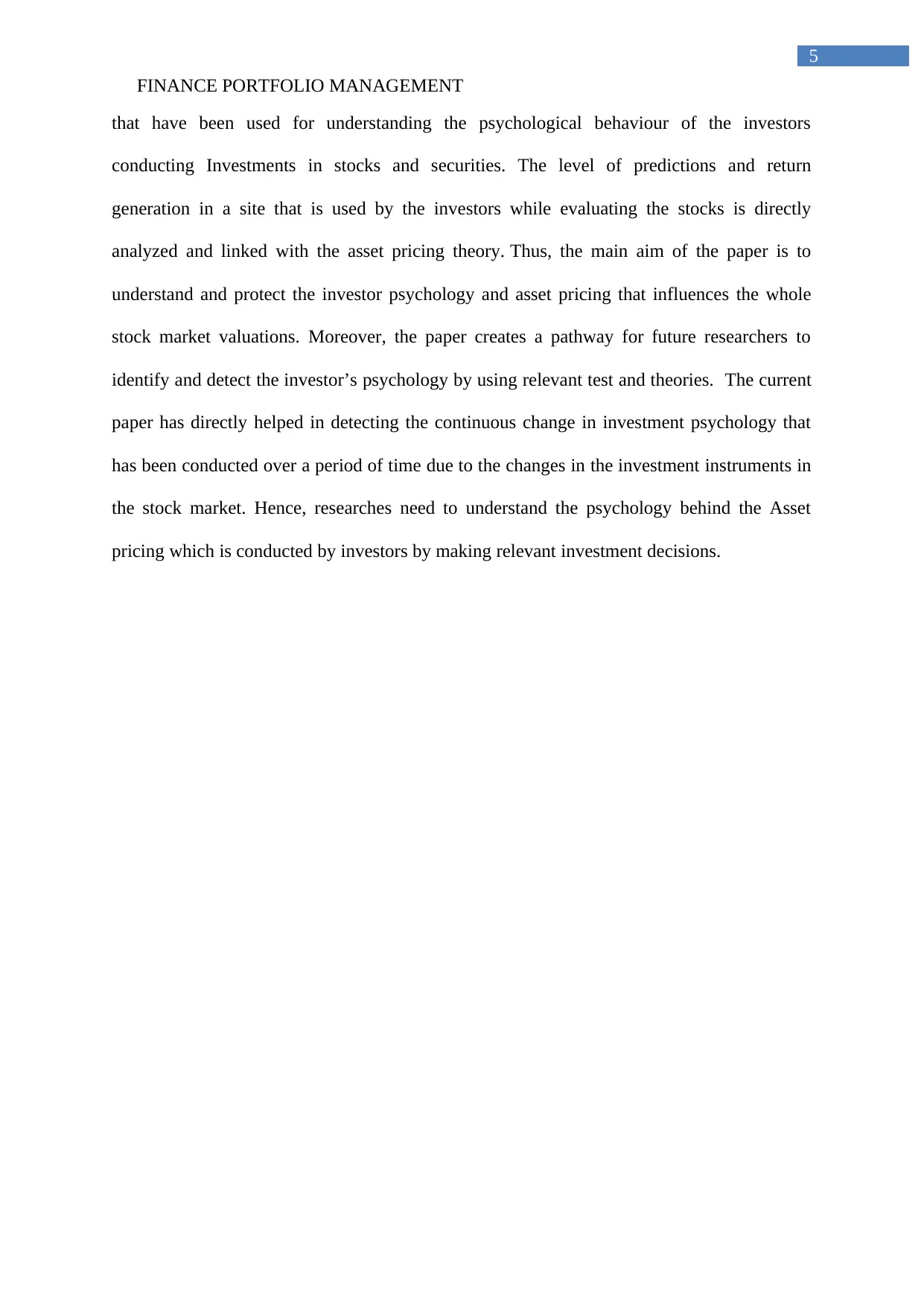
FINANCE PORTFOLIO MANAGEMENT
5
that have been used for understanding the psychological behaviour of the investors
conducting Investments in stocks and securities. The level of predictions and return
generation in a site that is used by the investors while evaluating the stocks is directly
analyzed and linked with the asset pricing theory. Thus, the main aim of the paper is to
understand and protect the investor psychology and asset pricing that influences the whole
stock market valuations. Moreover, the paper creates a pathway for future researchers to
identify and detect the investor’s psychology by using relevant test and theories. The current
paper has directly helped in detecting the continuous change in investment psychology that
has been conducted over a period of time due to the changes in the investment instruments in
the stock market. Hence, researches need to understand the psychology behind the Asset
pricing which is conducted by investors by making relevant investment decisions.
5
that have been used for understanding the psychological behaviour of the investors
conducting Investments in stocks and securities. The level of predictions and return
generation in a site that is used by the investors while evaluating the stocks is directly
analyzed and linked with the asset pricing theory. Thus, the main aim of the paper is to
understand and protect the investor psychology and asset pricing that influences the whole
stock market valuations. Moreover, the paper creates a pathway for future researchers to
identify and detect the investor’s psychology by using relevant test and theories. The current
paper has directly helped in detecting the continuous change in investment psychology that
has been conducted over a period of time due to the changes in the investment instruments in
the stock market. Hence, researches need to understand the psychology behind the Asset
pricing which is conducted by investors by making relevant investment decisions.
⊘ This is a preview!⊘
Do you want full access?
Subscribe today to unlock all pages.

Trusted by 1+ million students worldwide

FINANCE PORTFOLIO MANAGEMENT
6
Bibliography:
Hirshleifer, David. "Investor psychology and asset pricing." The Journal of Finance 56, no. 4
(2001): 1533-1597.
6
Bibliography:
Hirshleifer, David. "Investor psychology and asset pricing." The Journal of Finance 56, no. 4
(2001): 1533-1597.
1 out of 7
Related Documents
Your All-in-One AI-Powered Toolkit for Academic Success.
+13062052269
info@desklib.com
Available 24*7 on WhatsApp / Email
![[object Object]](/_next/static/media/star-bottom.7253800d.svg)
Unlock your academic potential
Copyright © 2020–2026 A2Z Services. All Rights Reserved. Developed and managed by ZUCOL.




